We caught up with the brilliant and insightful Michelle Awad a few weeks ago and have shared our conversation below.
Michelle, thanks for taking the time to share your stories with us today What do you think it takes to be successful?
As a poet in today’s world, I believe success hinges on mastering a balance of inspiration and discipline. Achieving this balance, in my opinion, requires poets to make a shift from a passive to an active mindset.
Poetry is a unique form of expression, such that most people attribute the art of writing poetry to the mere existence of feeling and emotion rather than viewing it as a dedicated practice or a technique that must be honed. This fundamental misunderstanding of poetry as an abstraction or as an intangible art form causes many—even poets themselves—to assume poetry only happens through spontaneous, diving inspiration instead of through intentional practice and skill refinement. A disservice is done to poets and poetry alike with this false assumption, as it eliminates the agency of poets as practitioners of the form and often leads to a perception of failure when “divine inspiration” isn’t consistently.
As a poet, I am often asked, “Where do you find inspiration?” This always feels like a very difficult question to answer, only because the asker is always looking for more of an answer than, “Look around!”
When it comes to inspiration, my personal philosophy is that poetry is everywhere, and everything is poetry. I truly believe that poetry would exist in the universe even if there were no poets to speak of. This is not to say that poets are obsolete, but that rather that the definition of “poet” may not be as most people think. To my mind, a poet is not one who creates poetry out of thin air; instead, a poet is one who simply notices poetry as it already is and takes it upon themself to make others notice it, too.
Sometimes, the poet’s ability to “notice” is almost intrinsic. Like the skills of a medium with spirits or an empath the emotions of others, some people are just naturally more in tune with the poetry of the universe—more sensitive to it. They notice is more easily. For others, though, I think it’s important to note that I believe anyone aspiring to be a poet can practice the art of “noticing” and essentially train their brain to recognize poetry when they see or hear it. It just takes opening your mind and viewing things from different perspectives. When everything can be a metaphor for something else, the possibilities are endless.
Once you open your mind to the poetry that constantly surrounds us, inspiration can be found in any place you look. Better yet, most of the time it’s found even when you’re not looking. At that point, being inspired becomes almost like second nature.
On the other side of the success scale is discipline. Every successful poet I know holds themselves accountable to a regular writing practice or routine. This routine looks different for each poet; the details are largely inconsequential—the key is simply to have a routine at all.
Poetry requires active dedication and practice. Committing to regular writing is another way to shift from a passive to an active mindset and can help poets refine their skills, explore new ideas, and develop their distinct style. Building a ritual of writing at the same time each day or week can even help train your brain to recognize when it’s “time to write”, making the writing you do during this time all the more productive.
Discipline in poetry extends to reading and studying a wide range of poetry as well to understand different forms, rhythms, and narrative techniques. Being a poet is a continual process of learning and self-improvement, and as the saying goes: consistency is key. Regularly producing and sharing work helps poets build a body of work and maintain visibility. It’s not just about writing consistently, but also about consistently engaging with your audience and the community.
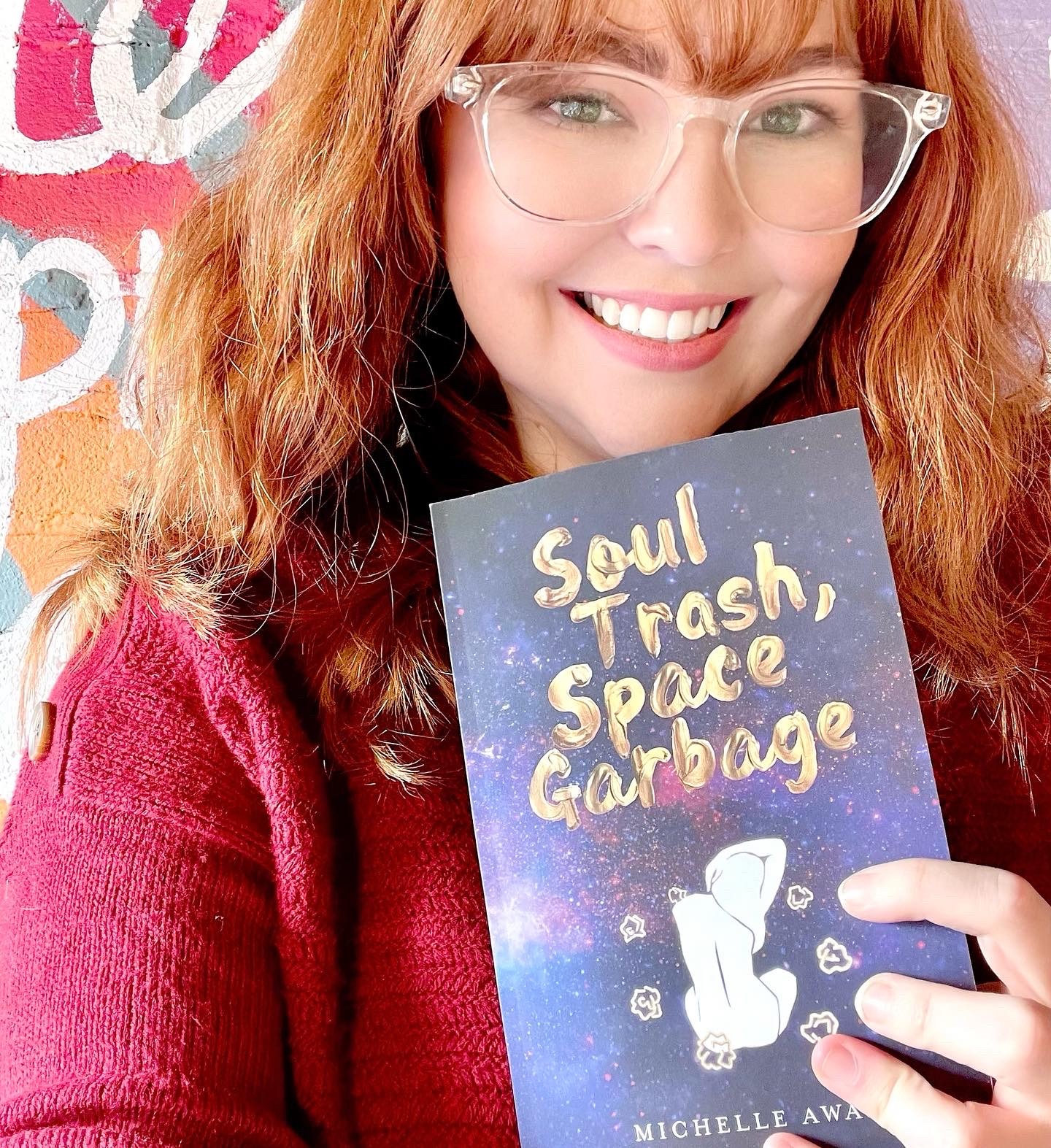
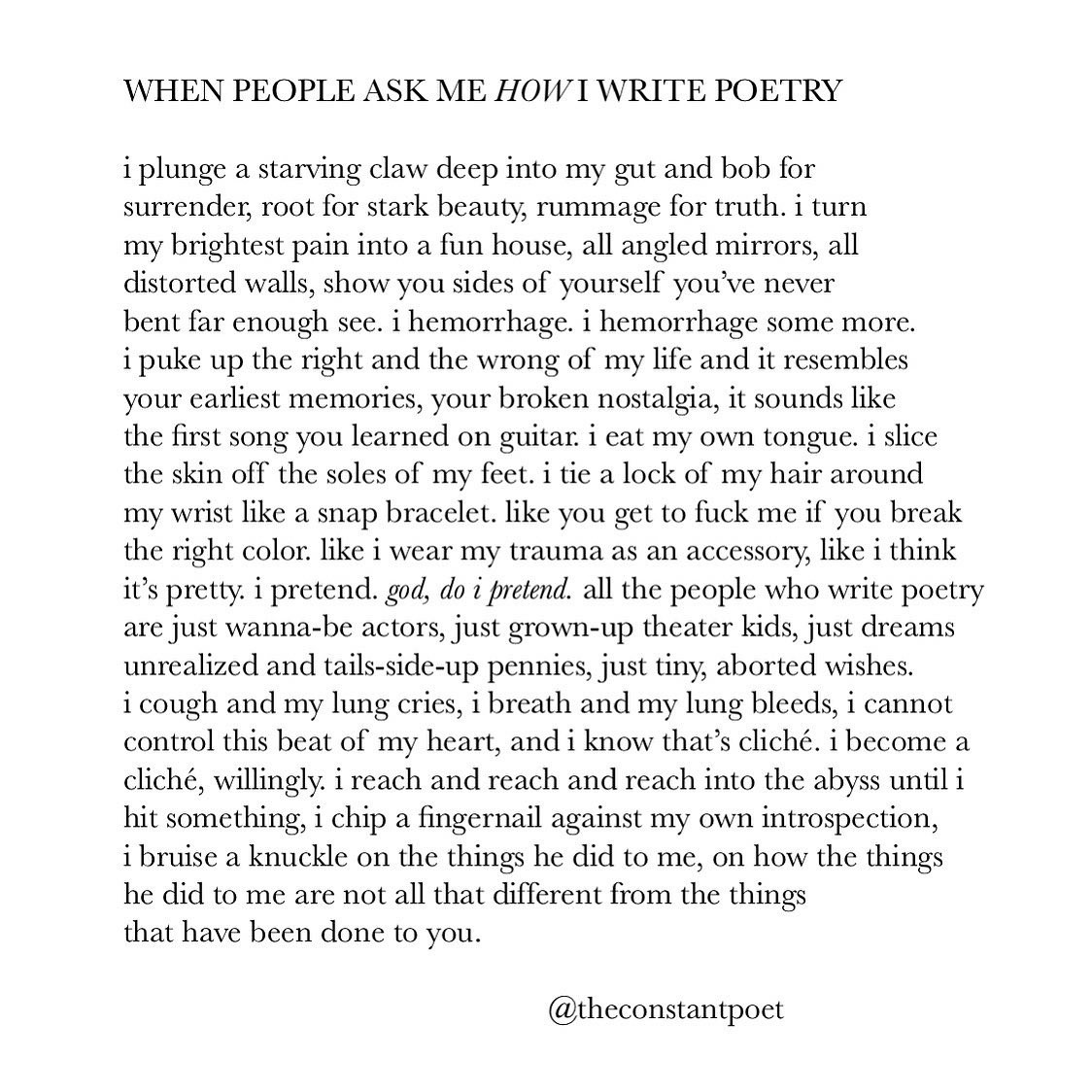
As always, we appreciate you sharing your insights and we’ve got a few more questions for you, but before we get to all of that can you take a minute to introduce yourself and give our readers some of your back background and context?
My name is Michelle Awad, and I’m a 32-year-old poet living in New Orleans, LA.
I’m originally from Tennessee where I earned a B.A. in English with a concentration in Writing, and I’ve been studying and writing poetry for over 15 years.
When I was young (middle school aged) I wanted to write novels and primarily wrote prose, but as I became more familiar with poetry, I gravitated toward it. I really enjoyed the freedom that poetry offered—I didn’t have to worry about being descriptive enough, and I could speak in abstractions all I wanted, and no one could really tell me it wasn’t “good” or “correct.” There was a level of subjectivity that I really appreciated with the art form.
My English teacher in high school became one of my mentors, and he took me along to several local poetry readings and competitions, which I managed to do well in, so I decided this poetry thing might be something worth diving into. As I got older, poetry gave me a unique way to process the very intense emotions I was having in adolescence while also affording me some semblance of control over my own narrative. It allowed me to lean into being utterly dramatic about my life without feeling like I was drawing too much attention to myself. Poetry offered me the best of both worlds in that respect.
Though I definitely had professors who were supportive in college, most of the adults I came into contact with there or elsewhere in my life made it clear to me that poetry wasn’t profitable or marketable and wasn’t a viable option for my future. I pursued my degree in English regardless and used my skills to do many different jobs, but I never really thought to prioritize poetry in my young adulthood because I had been told it was essentially a pipe dream or a waste of time.
After college, I experienced a bit of a lull in writing, and I struggled to feel like I could even call myself a poet. I found myself unfulfilled by my corporate job and ultimately uninspired by my life in general. When I visited New Orleans in October of 2016, I fell deeply in love with the city and its culture. It was the first time I could remember when my surroundings really inspired me to write, where the whole place brimmed with magic and creativity. Upon returning to Tennessee, my heart felt so homesick for New Orleans, in fact, that I could think of nothing other than moving there, and I became even more disillusioned with my life and my craft at that point.
For my New Year’s resolution in 2017, I decided I would write a poem a day for the entire year—no matter how short or terrible I thought they were. Soon after, I started my Instagram to hold myself accountable, and that’s how I ultimately got back into writing and started building my online community.
I spent several years posting poems online and getting to know other amazing poets before realizing poetry still holds a place in modern society and is not as obscure and obsolete as I’d been warned in school. During this time, I followed the call of my heart and moved to New Orleans by myself, which was both terrifying and exhilarating (easily the best decision of my life so far other than dumping that boy my sophomore year of college and finally deciding to get bangs). I continued to post poetry online consistently over the following years and built an incredible community of poets that I enjoy and admire to this day.
In December 2021, I self-published my first full-length poetry collection, Soul Trash, Space Garbage, which I am immensely proud of. In 2023, I hosted my first 4-day poetry retreat in New Orleans, and I’m currently offering a variety of online workshops and poetry consultations as well as poetry editing services. I’m currently hard at work writing my second poetry collection, and you can find updates on all my projects at www.theconstantpoet.com as well as more of my writing on Instagram @theconstantpoet.
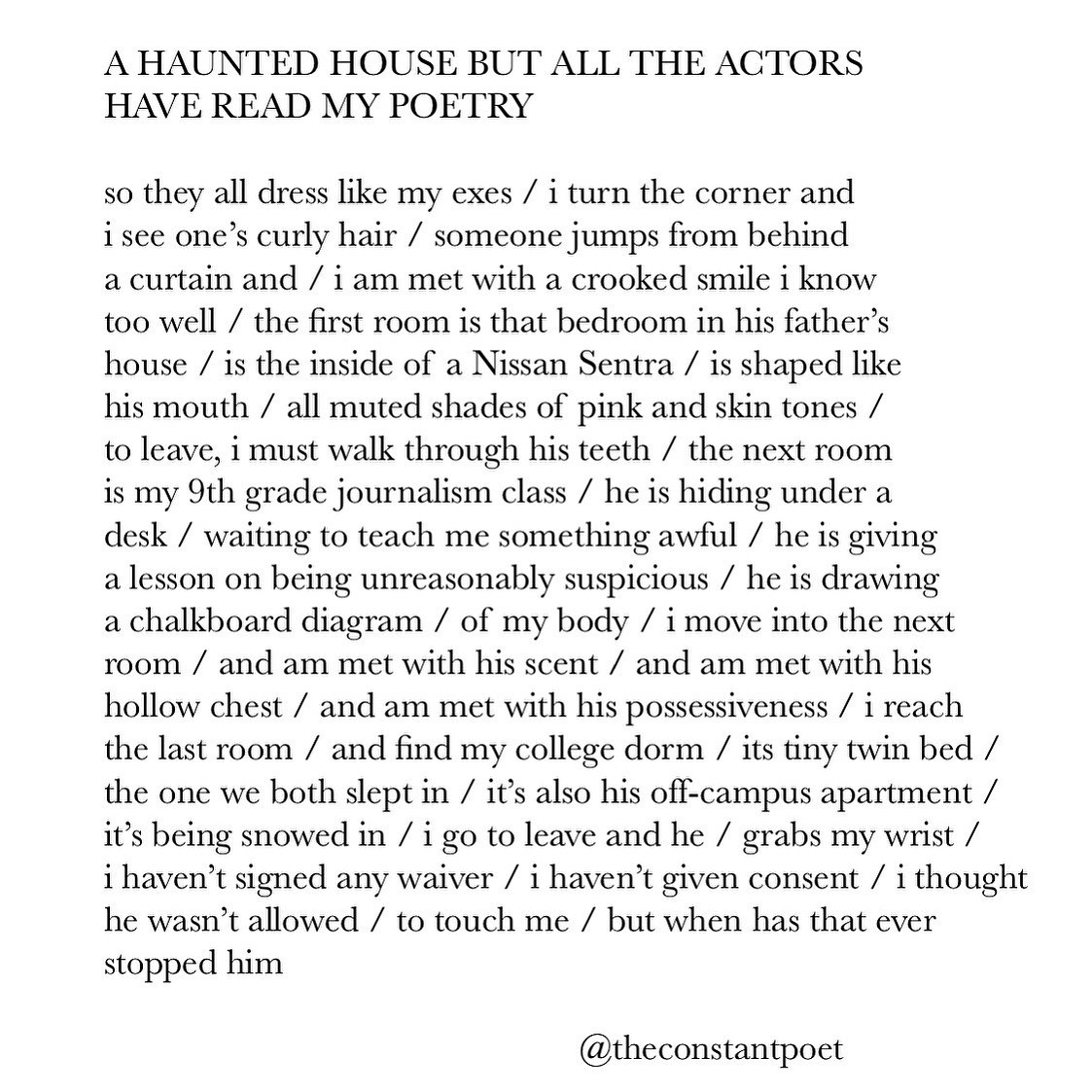
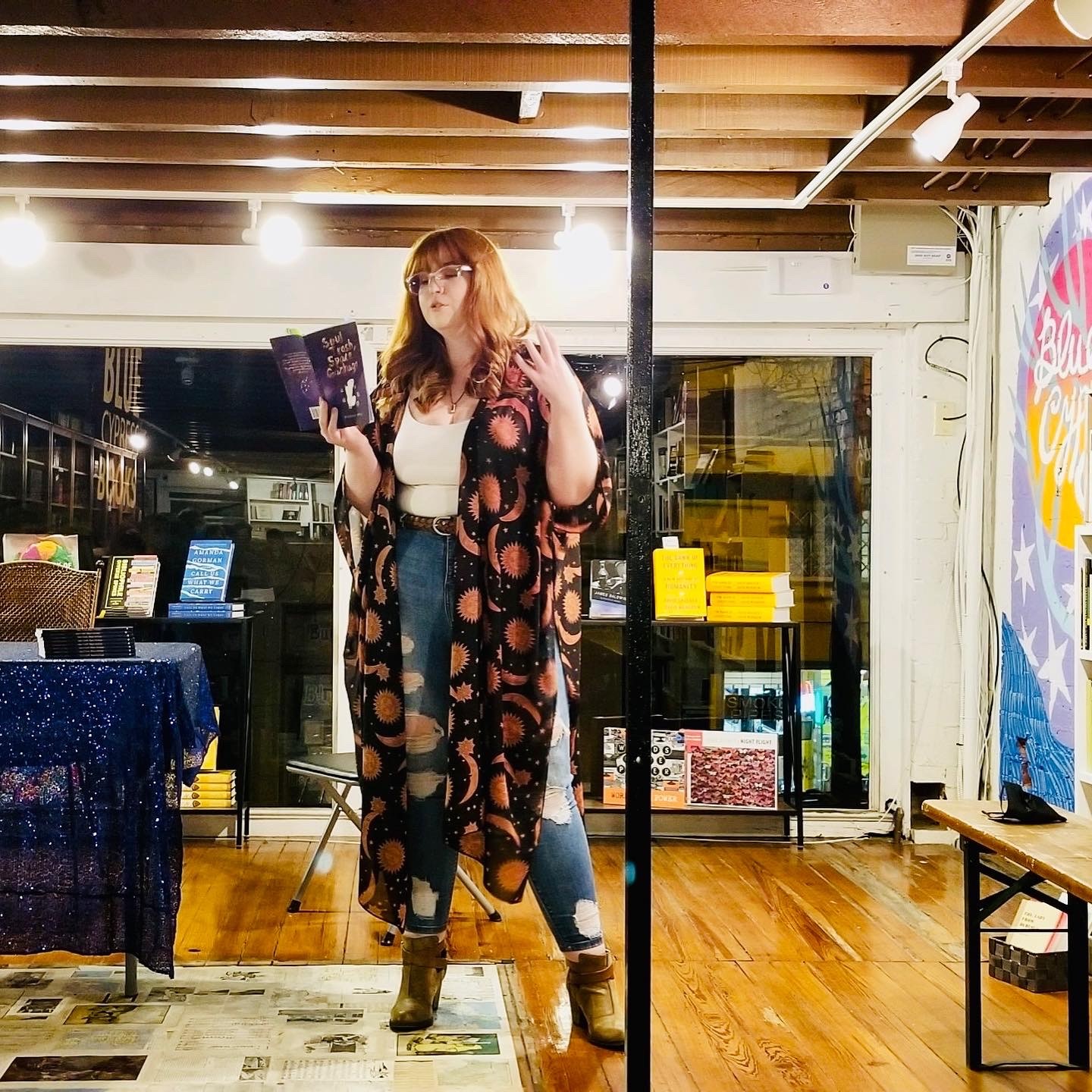
We’d love to hear the story of how you built up your social media audience?
The main things I can say that helped me build my social media following were consistency and authenticity.
When I first started my Instagram account, I was posting once a day. This (plus using numerous, relevant hashtags) keeps your audience engaged and helps attract new followers. In recent years, I’ve dropped down to posting about once a week, but posting more often when you’re first trying to build your following will do wonders. Posting at the same time every day, in my experience, is also helpful. I typically try to post between 11am and 2pm.
If you have room in your budget, I’d also recommend utilizing Instagram’s paid ads. My followers increased exponentially when I started boosting my posts, and even today, I see more engagement and increased followers when I either make a new post or when I boost an old post.
When it comes to authenticity, there’s so secret formula. I often get asked my opinion on themes or aesthetic elements of poetry accounts, but at the end of the day, if something is interesting to you, it will likely resonate with others. My poetry account has gone through its fair share of looks and feels, so don’t be afraid to experiment and change things up. Consistency, as I said, is important, but trying different methods and strategies to see what works is important as well. Don’t worry about trying to make your account like other accounts. Make your account a reflection of you.
Engagement is also a huge part of being authentic online. Interact with other poets, comment on their work, message them to chat about their latest poem, like, share, tag—all that fun stuff. You can also hold contests or giveaways to gain followers and broaden your reach. But even if you do absolutely nothing else, my main advice would be to respond to comments you receive on your posts. Yep. Every one of them. This does wonders to show people you’re real and to make them want to engage with you and your account. After all, the whole point of social media, and of poetry for that matter, is to connect!
While I primarily use Instagram for my poetry, TikTok is another great option that really emphasizes engagement and allows you to interact with your followers and fellow poets in fun, authentic, and interesting ways.
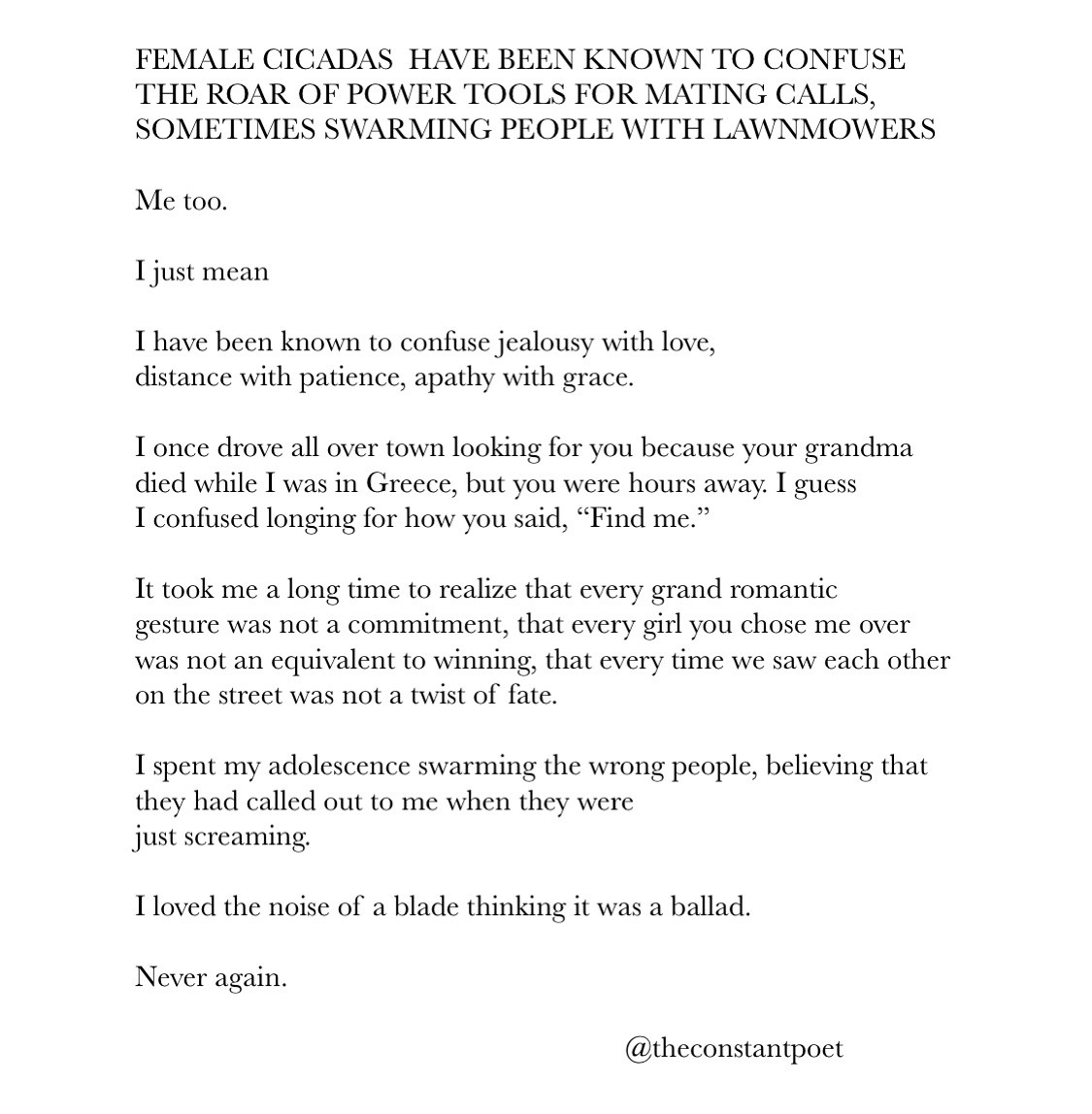
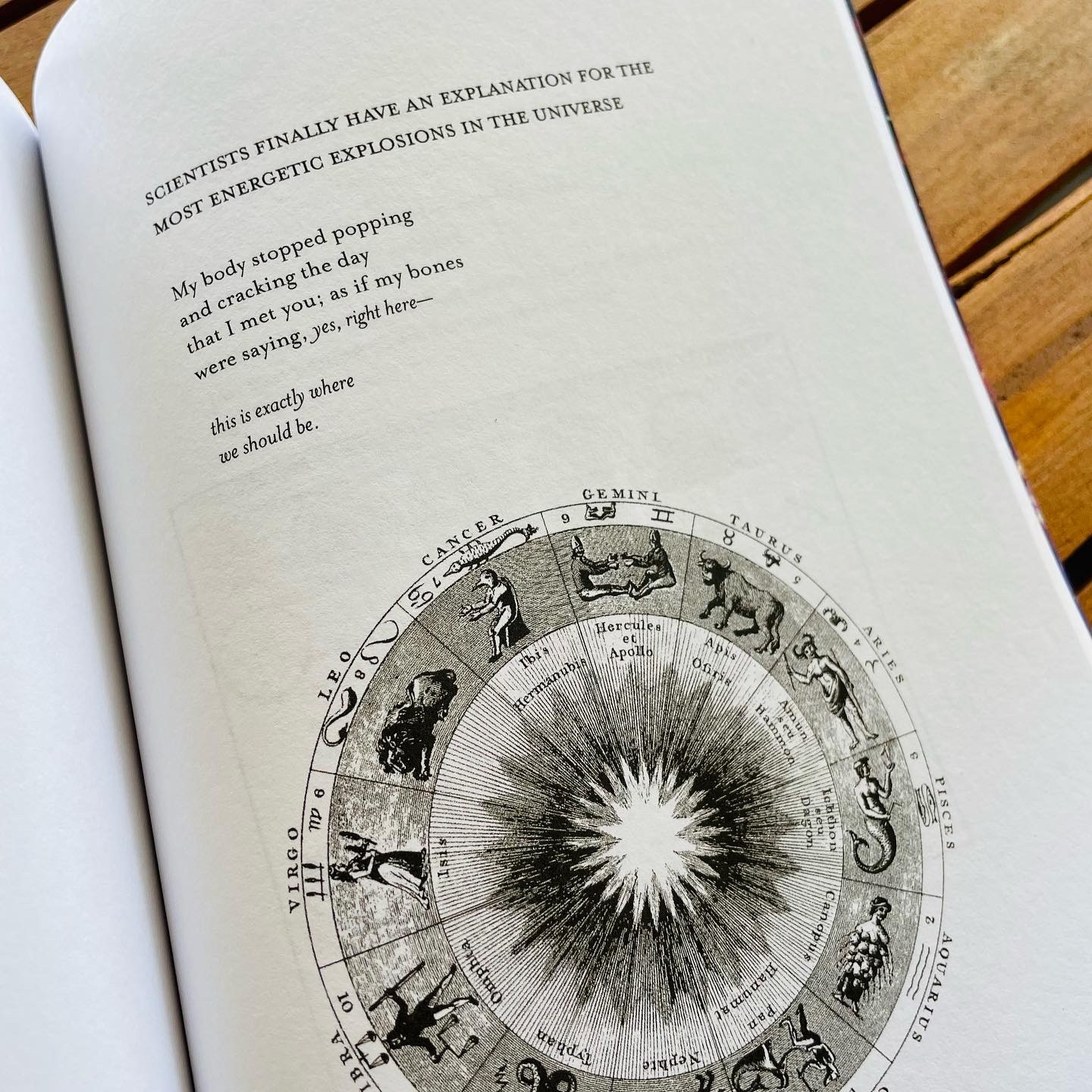
For you, what’s the most rewarding aspect of being a creative?
In my opinion, the most rewarding part of being a poet, or a creative in general, is the feeling of connecting with people. There’s little else like writing a poem about a very specific feeling or event that I think only applies to me and having someone I’ve never met tell me it resonated deeply with them. It’s a constant reminder that we are not as different as we like to believe, that at the end of the day, we all yearn for the same things, we all ache in the same places.
Knowing my work has helped even one person process something they’re going through, or given them a new perspective, or allowed them to heal in even the tiniest way is immensely rewarding, and it makes me want to keep baring my soul for every stranger on the internet to see.
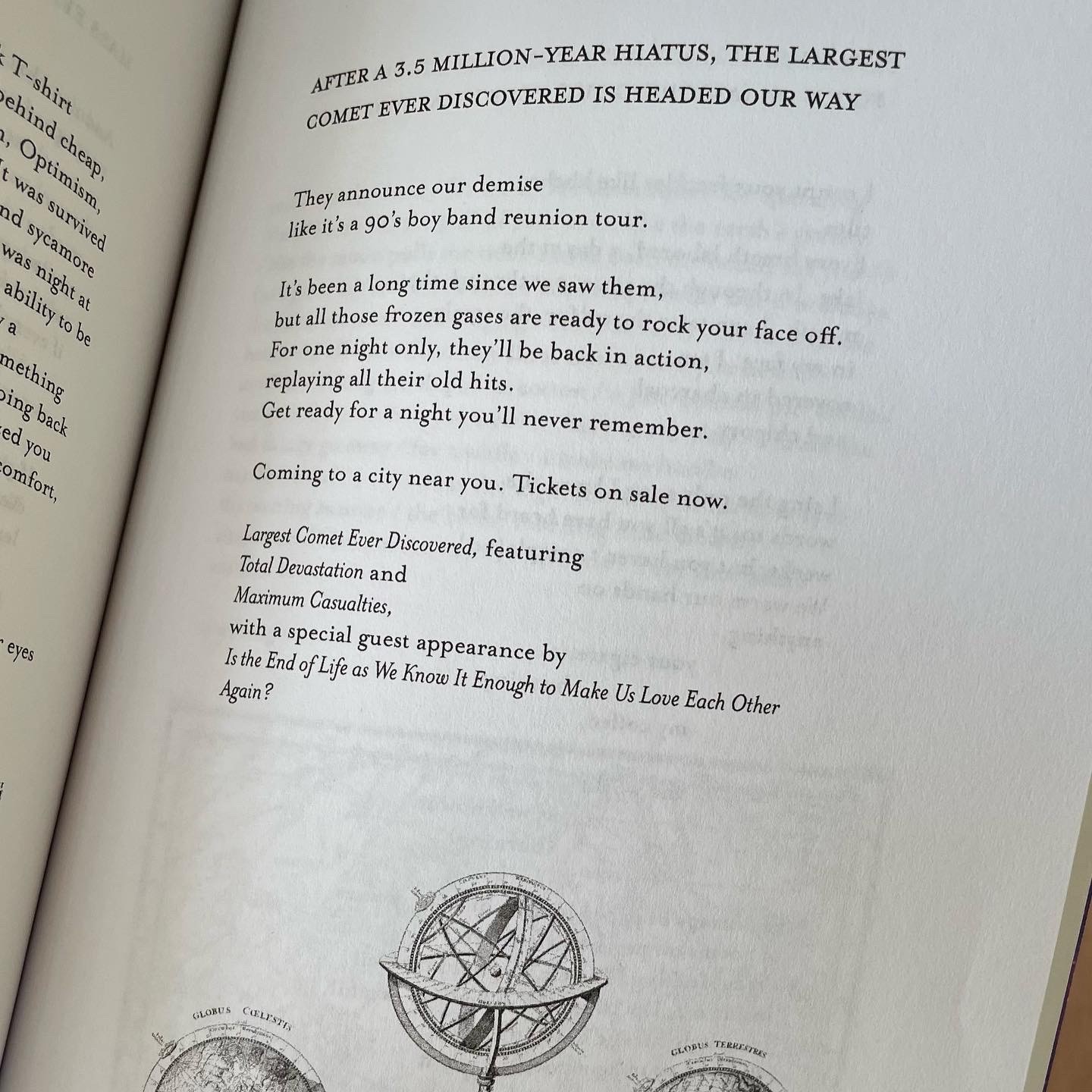
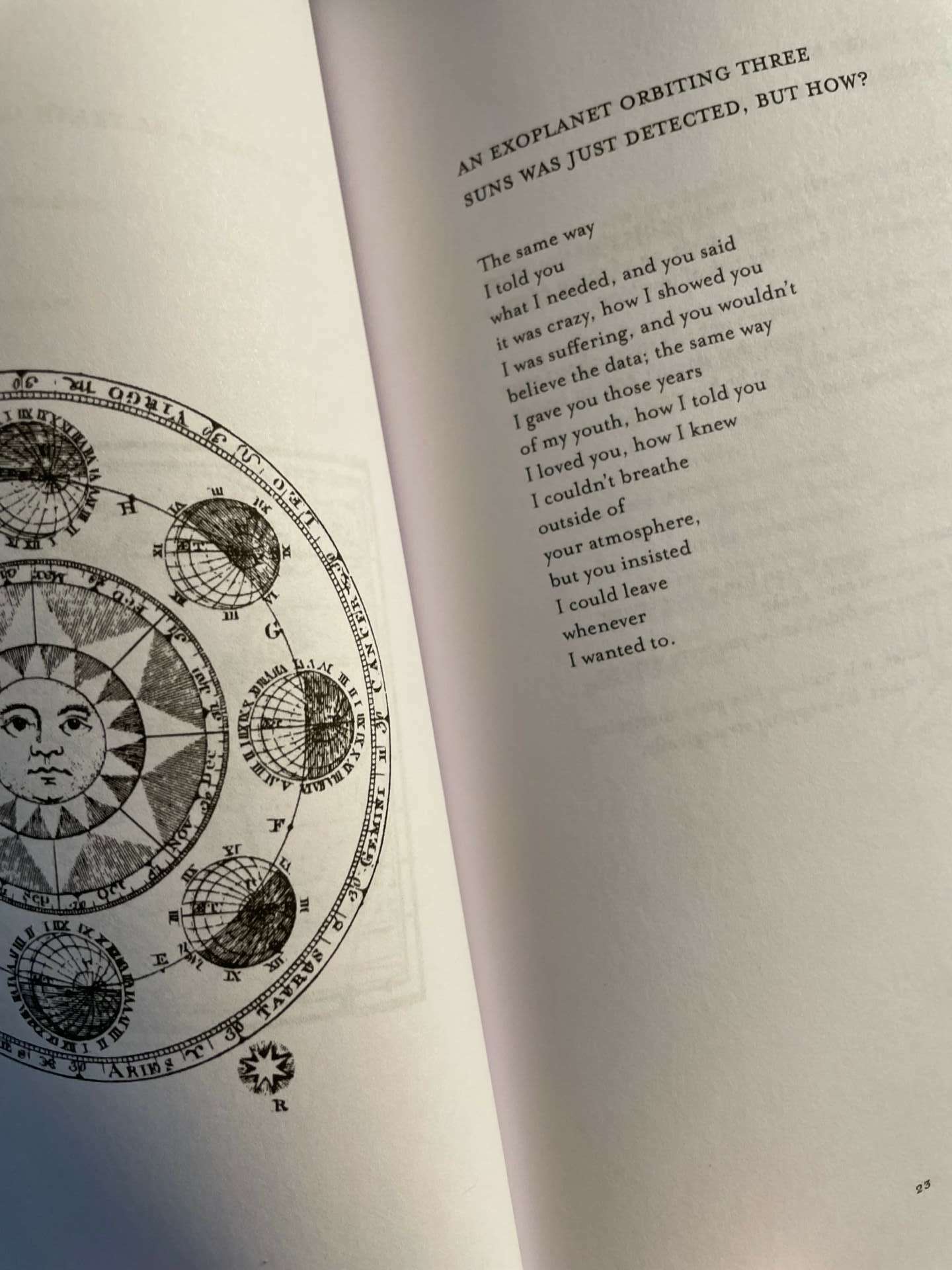
Contact Info:
- Website: www.theconstantpoet.com
- Instagram: @theconstantpoet
- Facebook: https://www.facebook.com/theconstantpoet1
- TikTok: @theconstantpoet


